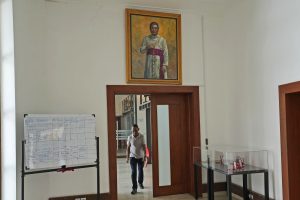This week, Pope Francis embarked on an 11-day trip to Asia, which will include visits to Indonesia, Papua New Guinea, Timor-Leste, and Singapore. For the past year, there have been rumors that he might add a visit to Vietnam following significant diplomatic efforts by the Vatican and Hanoi. The Communist Party of Vietnam has managed the not-too-difficult task of securing the Vatican’s silence over its repression of religionists, but it seems that Francis’ entourage deemed a trip to a communist state a little too much for the aging pope.
We’ll see if he confronts a far more difficult issue when he lands in Dili. In September 2022, Dutch journalist Tjiyske Lingsma published an article in De Groene Amsterdammer detailing how Nobel Peace Prize-winning East Timorese independence hero Bishop Carlos Ximenes Belo had raped and abused boys in the 1980s and 1990s. A day after the article was published, the Vatican confirmed that it had known about the allegations since 2019 and had sanctioned Belo sometime in 2020.
Belo, now 74, shared the 1996 Nobel Peace Prize with José Ramos-Horta, who later became Timor-Leste’s president. Belo was specifically recognized for helping to sneak two witnesses of a 1991 massacre out of the country so they could testify to the United Nations Human Rights Commission. Timor-Leste gained its independence from Indonesia on May 20, 2002. In October 2002, he met privately with Pope John Paul II and tendered his resignation as Apostolic Administrator of Dili, which was accepted the following month. In January 2003, Belo left Timor-Leste for good, and the following year he became an “assistant priest” in Mozambique, where he reportedly engaged in “pastoral work by teaching catechism to children, giving retreats to young people.”
Timor-Leste is a deeply Catholic country, but it is struggling to come to terms with historic cases of child rape. Richard Daschbach, an American priest, was also revered for running a children’s home in Timor-Leste during the Indonesian occupation. In December 2021, a Timor-Leste court convicted him of sexually abusing girls in the shelter home he ran and sentenced him to 12 years in prison. Xanana Gusmão, the most prominent politician since 2002 and now prime minister, came to the convicted pedophile’s defense. He visited Daschbach while under house arrest and even attended Daschbach’s birthday party inside Becora Prison last year.
Most reports about Pope Francis’ upcoming visit focus on how the East Timorese will react if he mentions Belo’s crimes. The Associated Press paraphrased an expert on this issue as saying: “[Daschbach and Belo’s] heroic status, and societal factors in Asia, where the culture tends to confer much power on adults and authority figures, helps explain why these men are still revered while elsewhere in the world such cases are met with outrage.”
That would be a good argument only if you were ignorant about how long it took other historic cases of priests raping children in Ireland and Italy and the United States and Germany, etc, to come to light – and, indeed, about how victims in these parts of the world are still often dismissed, and how the faithful in these non-Asian countries still struggle to accept that their priests have raped children.
The point in all of this isn’t over whether the East Timorese can accept a national hero is also a sinful pedophile. Yes, one should certainly question why national leaders like Prime Minister Gusmão are comfortable consorting with convicted child rapists. But Belo hasn’t lived in Timor-Leste for decades. He is currently believed to be in Portugal and is prevented from traveling freely by the Vatican. Justice shouldn’t only come when there’s overwhelming public approval; nor, indeed, should public contrition by the Catholic Church be avoided lest it offend the credulous.
So why isn’t the Catholic Church pressing Portuguese prosecutors to open a criminal investigation? Why hasn’t the Vatican shared with Timor-Leste’s prosecutors the information it had to sanction Belo? It seems to have gone unquestioned that the Vatican disciplined Belo in 2020 but decided only to make this known to the public (and his victims) two years later when a journalist broke the news. The Pope’s ministers obviously thought it was unimportant to make it known until they sniffed publicity. Is this the sort of transparency that Pope Francis promised? (Note, too, that the Catholic Church also kept quiet the allegations about Daschbach until a Timor-Leste court convicted him.)
This isn’t about how East Timorese society views its national heroes, nor about how Asians apparently respond differently to allegations of abuse. Nor is it about Pope Francis needing to appease the East Timorese faithful – who may or may not believe Belo is a pedophile – or about him appeasing the East Timorese elite. Even if the church in Timor-Leste doesn’t want to sully the Pope’s historic visit by talking about how their own flock raped children, Pope Francis should land in Dili and plead to the victims for forgiveness and demand his own institutions do the same.

































